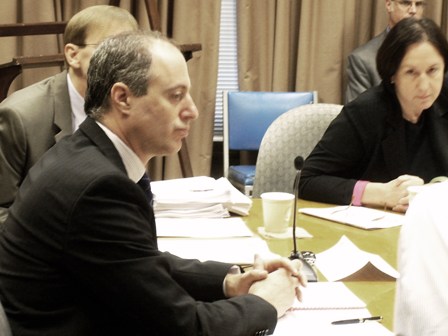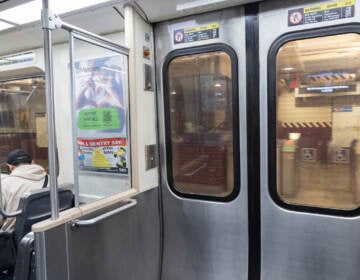Design Review on the fast track

April 23
Previous PlanPhilly coverage
Inquirer coverage
By Matt Blanchard
For PlanPhilly
Contrary to earlier reports, design review is on the fast track in Philadelphia, with plans to implement the reform being drawn up right now.
While a recent Inquirer article suggested the city’s new deputy mayor for planning and commerce, Andrew Altman, opposed the rapid implementation of a design review board, Altman himself said on Wednesday that the paper “didn’t get it right.”
Altman is indeed leery of rushing other reforms – from inclusionary housing to green building requirements. But on design review he’s all systems go.
“We are looking at design review to bring to the mayor and the city council,” Altman said. “I think there are some reforms you can do in the short term.”
To that end, the City Planning Commission will present suggestions for legislation to City Council next week.
New projects in Philadelphia must already clear zoning and planning reviews, but no part of city government is empowered to judge whether a building is simply ugly. In cities like Boston, Baltimore and Atlanta, a design review board staffed by architects and designers reviews all sizeable projects to encourage – and sometimes enforce – a higher standard of architecture.
But there is a devil, Altman believes, in the details.
“Design review has to be carefully structured so it’s fair and open, and doesn’t just become one more bureaucratic stop,” he said. “In some places it’s very successful. In others, it’s an enormous beauty contest.”
Philadelphia has at least two options: Establish an independent board, or empower the existing Planning Commission to review the appearance of designs. Smart money is on the latter.
Altman added that the city has already strengthened its hand by including sunset provisions when granting a zoning change. At a hotel project called Stamper Square in Society Hill, for example, city planners have sought a binding agreement that will nullify any zoning change if developer Marc Stein does not build the project he’s presenting.
“Design review may already be happening,” Altman explained. “If you present a project for rezoning … we’ll hold you to the buildings and the standards of that plan. Either you build it, or the zoning goes away.”
It remains to be seen how Philadelphia architects will react to well-intentioned meddling by a jury of their peers. In the best cases, review boards are said to generate valuable new ideas, and may even bolster an architect’s position with a corner-cutting client. In the worst cases, their decisions have been attacked as arbitrary.
On Wednesday, architect Emmanuel Kelly sounded impatient to get some form of design review up and running.
“There has to be something,” Kelly said, “because right now, there’s nothing.”
Now, about those other reforms…
Beyond design review, Altman sent a very different message in a speech before the Zoning Code Commission on Wednesday, a message he hoped would be “kind of sobering”:
Some of the more popular ideas to reform development in Philadelphia, he said, may end up driving developers away.
That’s because reforms like mandatory green building requirements and inclusionary zoning (mandatory affordable housing) add to the cost of projects. While high-rent markets like New York City can bear the cost of these reforms, adding the same costs in Philly’s low-margin market could make it an impossible place to build.
“With green building, there’s a cost. With inclusionary zoning, there’s a cost,” Altman said. “Someone’s paying for these things. You can say it’s the developers, but we all know they’ll pass that on.
“New York can afford their appetite for these reforms,” he continued. “In Philadelphia, we have to look at how we can balance our social and environmental objectives with the economic situation … You don’t want to look back in two years and say ‘Gee, I wonder why we’re not seeing any development in the neighborhoods?’”
ZCC member John Westrum, one of the only developers to tackle large-scale residential projects in the city, voiced his agreement in almost anguished tones.
“Philadelphia is the most difficult, the most expensive, and the least profitable city in the top 5 or 10 cities in the country,” Westrum told the commission. “So many people are passionate about investing in the city of Philadelphia. Problem is, every time they do they get burned.”
“Let’s get ourselves to the position where we have a thriving market before we get green buildings and these other things.”
Apparently sobered, no one on the ZCC challenged this assessment.
But one of these controversial reforms has already passed City Council. In December of 2006, Councilman Darrell Clarke pushed through an inclusionary housing bill (#071005) requiring the developer of any project over 20 units to either set aside 10% of units of below-market renters or pay into a city fund.
ZCC gets liaison
Finally, it’s worth noting that like all good visitors, Altman came to Wednesday’s ZCC meeting with a housewarming gift. Having heard ZCC members desire both “attention” and “direction” from the Nutter administration, Altman introduced Brian Flannigan, a former New York City planner, who will now serve as liaison between the commission and Altman himself.
Flannigan’s principle experience was with New York City Council speaker Gifford Miller. He worked on the rezonings of entire neighborhoods, some 3,300 city blocks in places like Greenpoint, Williamsburg and the Hudson Yards.
Contact the reporter at blanchard.matt@gmail.com
WHYY is your source for fact-based, in-depth journalism and information. As a nonprofit organization, we rely on financial support from readers like you. Please give today.






